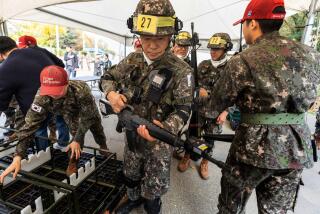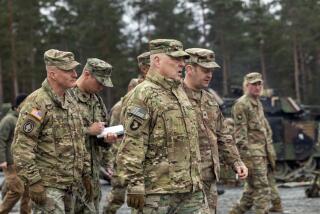Army Training Facility in W. Germany : Just Don’t Call It a ‘Spy School’
- Share via
GARMISCH, West Germany — Surrounded by snow-capped Alpine peaks, an elite U.S. Army school turns out experts on the Soviet Union. They go on to become military attaches, Pentagon intelligence analysts and even ambassadors.
But, says the colonel in command of the U.S. Army Russian Institute, don’t call the Bavarian outpost a “spy school,” as some Soviet and other critics insist that it is.
Col. Richard S. Kosevich adds that the institute will become even more important if agreements are reached with the Soviets on cutting back missiles or conventional arms.
The institute’s two-year program covers Soviet military and political affairs, Marxism-Leninism, the news media, military history, arms control and the fine points of the Russian language, as well as numerous other subjects.
The student body ranges from about 40 to 50 at a time, one-third civilian from the U.S. State Department and the Defense Department and two-thirds military. About half a dozen are women.
The courses are taught in Russian, and Soviet military posters with Cyrillic script fill the walls. There’s a large portrait of President Mikhail S. Gorbachev in one hallway.
The school, with a current faculty of 18, has turned out more than 800 graduates since it was founded in 1947, originally to train officers to deal with the Soviets when Germany was occupied by Allied armies.
Among the more recent graduates was Maj. Arthur D. Nicholson Jr. of the U.S. Army, who was shot to death by the Soviets in March, 1985, while on a patrol in East Germany from his base in Potsdam.
Graduates who have gone on to serve in high diplomatic posts include Jack F. Matlock Jr., ambassador to the Soviet Union, and Roger Kirk, the ambassador to Romania.
The school’s graduates fill military attache posts in U.S. embassies throughout the Soviet Bloc as well as in Helsinki, Finland, and in Vienna. Others advise the U.S. military in West Germany, man the “hot line” between Washington and Moscow, work as Defense Department intelligence analysts in Washington and teach and perform many other tasks.
“If we get a SALT agreement or if we get a conventional arms agreement, the demand for people who can speak Russian and have military knowledge is going to be 100 times what it is right now,” Kosevich said.
He added that the student body will increase to 75 students by the summer of 1990.
“Military-to-military contacts with the Soviet army are opening up, expanding all the time. We hope to get more and more involved in that.”
The institute is part of the U.S. Army’s Intelligence and Security Command. It is in a single building inside a sprawling Army post in Garmisch, ringed by craggy Alpine peaks that also provide some of the best skiing in West Germany.
The students arrive after having at least one year of intensive Russian-language training and after getting a master’s degree in Soviet studies at an American university.
Kosevich emphasized in an interview the importance of having native Russian speakers as teachers, many with professional credentials.
“This enables us to get into the thought processes of the Soviet professional officer, both military and civilian, to understand how he thinks, acts and reacts.”
Capt. Ted Kirkpatrick, 33, of Minneapolis, came to the school after starting his Russian-language studies in high school and continuing them in college.
“I guess my long-term goal is to become an attache in Moscow,” he said.
When the school was founded after World War II, most of the teachers were “displaced persons” from the Soviet Union. Now the 16 native Russian speakers on the faculty are mainly legal emigres from the 1970s.
“American students are more devoted to what they are doing,” said instructor Lev Yudovich, a former defense lawyer in Moscow who also taught postgraduate law courses.
“They want to understand, really want to understand the current developments.” he said.
The 64-year-old Yudovich added that he is troubled by the bad treatment the school has received in the Soviet news media, including a recent article in Pravda, the Soviet Communist Party newspaper, which referred to it as a spy school.
He calls the Soviet press efforts a “continuation of psychological war.” But Kosevich remains optimistic.
More to Read
Sign up for Essential California
The most important California stories and recommendations in your inbox every morning.
You may occasionally receive promotional content from the Los Angeles Times.










